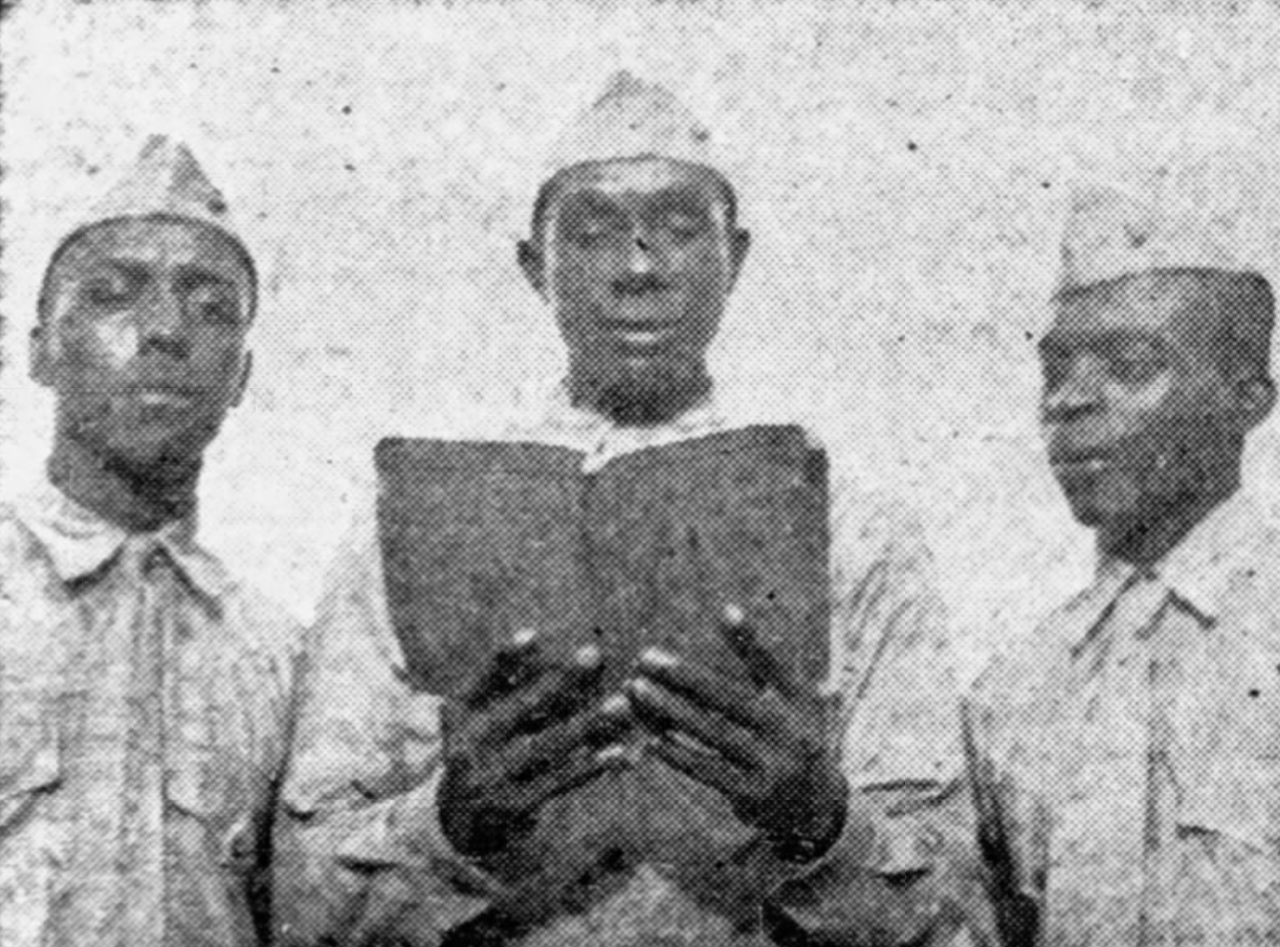
Steps toward desegregating the U.S. Armed Forces during WWII soon brought major social change. The old prejudices of Jim Crow America gave way to more openness towards other races and ethnicities, and a certainty that, as with Nazi Germany, white supremacy had to be eliminated. At ECTC, the new openness surfaced in unprecedented ways when the first African American Marine Corps unit – the 51st Composite Defense Battalion of New River Marine Barracks – (now Camp Lejeune) – in Jacksonville, N.C., made history by breaking, albeit briefly, the bigoted mold of Jim Crow culture: on Sunday, December 6, 1942, one day before the first anniversary of Pearl Harbor, the 51st Battalion Choir performed “Negro spirituals” at the combined YWCA/YMCA vesper hour. This was the first occasion in which African Americans figured prominently in any role at East Carolina other than housekeeping, maintenance, and cooking. While a local jazz band, the Cavaliers, later gained fame, in 1958, as the first African American musical group to appear in Wright Auditorium, that very secular entertainment was preceded by the 51st Battalion’s more spiritual offering in 1942.
The Black Marine choir was accompanied by a white chaplain, Rev. Philip H. Grice, who spoke on “What it Means to be a Christian.” Before and after Grice’s remarks, the thirty-man choir – directed by Pvt. Ivan Randolph Elmore (1924-1985) – sang selections from three groups of Negro spirituals. Prior to joining the Marine Corps Reserves at New River and then leading its choir, Elmore had won fame in the D.C. area as the leader of the Exotic Harmonies, “five sweet Deanwood voices that started harmonizing way back in high school days in Washington.” According to Elmore, by “the summer of 1942, we [the quintet] had a reputation second to none in Deanwood. We sang at dinner parties, birthday parties, civilian defense meetings, church programs and funerals. We were all members of the Zion Baptist Church Choir of Deanwood.”
After the Marines began recruiting African Americans in June 1942, the five members of the Exotic Harmonies – including Elmore, William E. Branch, Albert J. Hollingshed, Thomas M. Branch, and James E. Brooks – “hurried to the nearest recruiting station and were sworn in as a group.” By September, Elmore, Hollingshed, and Branch had been assigned to the Marine Barracks at New River. Shortly after, they auditioned before Col. Samuel E. Woods and were given permission to form a Marine Corps Choir and “put in full charge of the musical part of camp programs.” By December 1942, the Choir had given performances at the Baptist Church in Jacksonville and the First Presbyterian Church in Raleigh – for “a joint service of white and Negro Presbyterian congregations.”
The Teco Echo account of the Marine Choir’s ECTC performance only mentions that the songs were “Negro spirituals,” without listing titles. It did, however, recount the gist of Rev. Grice’s remarks. Grice called Christians “the salt of the earth,” “the light of the world,” and “the brandies of the Vine,” adding that “Christians are truly like Christ only when they realize that he who loses his life in service shall find it.” Grice noted that while he and other members of the Armed Forces “were willing to give their lives if need be to help usher in the new world … churches at home [should] do their part to see that the new world is a better one.” Grice reminded ECTC of the sacrifices ahead needed to realize “the new world,” a reference not only to the new international order that would follow the defeat of the Axis powers, but also the new social order that would supplant Jim Crow segregation with the kind of sharing in space, time, and energy modeled by the Marine Choir’s performance at the campus vespers.
The Marine Choir’s pioneering performance was an outgrowth of President Franklin Roosevelt’s Executive Order 8802, issued on June 25, 1941, eliminating racial discrimination at the federal level. That resulted in, among other things, the beginnings of the desegregation of the U.S. military including the Marine Corps. However, while African Americans were admitted to the Marines, the transformation was managed by having a separate training facility for African Americans established at Montford Point in Jacksonville, N. C., named the 51st Composite Defense Battalion of New River Marine Barracks, proximate but distinct from the white Marine Corps Base in the same town.
The choir’s performance was historic insofar as it foreshadowed later appearances, in peacetime, of African American civilian performers who helped lead the way in desegregating campus culture and eventually the student body as well. The Marine Choir’s performance received only brief coverage in the Teco Echo, it was, when viewed in terms of later changes, arguably a monumental harbinger of long overdue advances forward to a new social balance at East Carolina.
Sources
- “A Negro Marine Camp.” News and Observer. Nov. 10, 1942. P. 20. https://www.newspapers.com/image/651738849
- Carraway, Gertrude. “Negro Marines Make Good Start.” News and Observer. September 13, 1942. P. 7.
- "Cavaliers To Perform Here October 29." East Carolinian. October 23, 1958. Vol. 34, No. 5. https://digital.lib.ecu.edu/38611
- “Chaplain Speaks.” News and Observer. November 4, 1942. P. 7.
- "First Negro Entertainers On Campus." East Carolinian. May 14, 1959. Vol. 34, no. 25. P. 3. https://digital.lib.ecu.edu/38631
- “Marine Corps Choir Organized At New River: Dee Cee Quintet Inducted As Group Gives First Concert.” Pittsburg Courier. Oct. 3, 1942. P. 2.
- “Marine Negro Choir.” News and Observer. October 5, 1942. P. 12.
- Nalty, Bernard C. “The Right To Fight: African-American Marines in World War.” Marines in World War II Commemorative Series. https://www.nps.gov/parkhistory/online_books/npswapa/extcontent/usmc/pcn-190-003132-00/sec5.htm
- “Negro Spirituals Sung At Vespers By Marine Choir.” Teco Echo. Vol. XVIII, no. 5. December 11, 1942. Pp. 1, 4. https://digital.lib.ecu.edu/37912
- “Young Women’s Christian Association.” Tecoan (1943). Pp. 110-111. https://digital.lib.ecu.edu/15348
Citation Information
Title: 51st Composite Defense Battalion New River Marine Barracks Choir Performs at ECTC, 1942
Author: John A. Tucker, PhD
Date of Publication: 3/21/2022